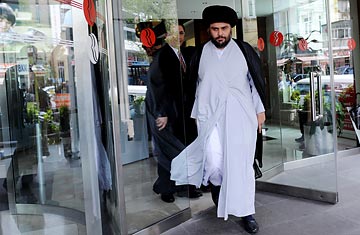
Sunni parliamentarian Salim al-Jubouri took Muqtada al-Sadr's recent appearance in Turkey as a good sign. Sadr surfaced in Ankara ostensibly to discuss the situation in Iraq with top Turkish leaders, including President President Abdullah Gul and Prime Minister Recep Tayyip Erdogan. Turkey is a predominantly Sunni country, many observers noted, and maybe the militant Shi'ite warlord was making a show of nascent sectarian reconciliation. "The attitude is good," says al-Jubouri, a member of the Sunni political bloc known in Arabic as Tawafiq. "But so far it's all talk, we need to see actions."
All talk indeed. Sadr's visit to Turkey a week ago, his first public appearance in nearly two years, has renewed talk in Baghdad about what his plans might be in the months and years ahead. "I think Sadr picked Turkey to show himself in order to prove that he's against sectarianism... and to try and kill the rumor that he is an Iranian toy," says Tahseen al-Shekhli, a spokesman for the Iraqi government, which gained the upper hand over Sadr's Mahdi Army forces in heavy fighting last year. Sadr's followers, for their part, are notably reticent on the subject. Several figures prominent in Sadr's political ranks refused to discuss the topic when contacted by TIME. That has left some in Iraq revisiting an old question that no one so far seems to be able to answer well: Where is Sadr living, and what is he planning next? (Check out a discussion on why Obama has to make do with less than perfect allies in critical regions.)
The truth is that no one really understands Sadr's thinking and doings aside from the cleric himself and presumably his innermost circle of followers. The most common assumption in Baghdad about Sadr is that his long absence from sight means that he has been undergoing intensive religious instruction in Qom, Iran, the leading center for Shi'ite Islamic scholars. Through his studies in Qom, Sadr could rise from a cleric to the rank of ayatollah, giving him the authority to issue edicts taken as law by many Shi'ites. With that power, Sadr could eventually position himself to replace Iraq's current leading Shi'ite figure, Grand Ayatollah Ali al-Sistani, who is thought to be in his late 70s.
Sadr's ambition to be the grand ayatollah of Iraq is taken as a given by many observers in Baghdad. But whether the Shi'ite clergy in Iran will allow this remains murky. Some observers figure that Sadr, who has a reputation as a dullard, simply does not have the intellect Qom's religious instructors demand in would-be ayatollahs. In other words, Sadr may flunk out of ayatollah school and never attain the kind of religious authority many believe he hopes to wield in Iraq in future years.
If that turns out to be the case, Sadr could still return to Iraq and reassert himself at some point with two powerful political cards he currently retains: a sizeable bloc of loyalists in the parliament and, most importantly, the still powerful Mahdi Army militia. Sadr issued a cease-fire edict to the Mahdi Army late last year as the militia struggled to fend off a crackdown by strengthened Iraqi security forces. But dormant fighters with the group say they are ready to take to the streets again if Sadr sends out the call, a prospect that has many in Baghdad increasingly worried lately as sectarian violence appears to be inching upward.
For his part, Sadr has remained consistent in saying nothing. He offered no statements during his appearance in Turkey and has not been seen or heard from since then. With reporting by Mazin Ezzat/Baghdad
